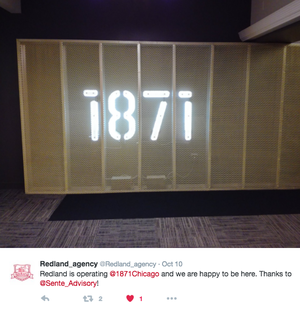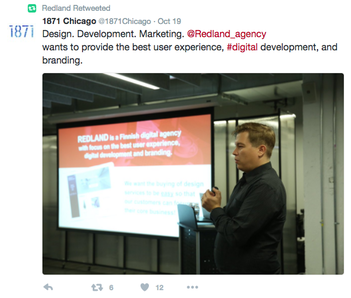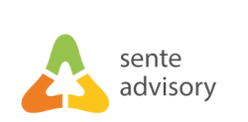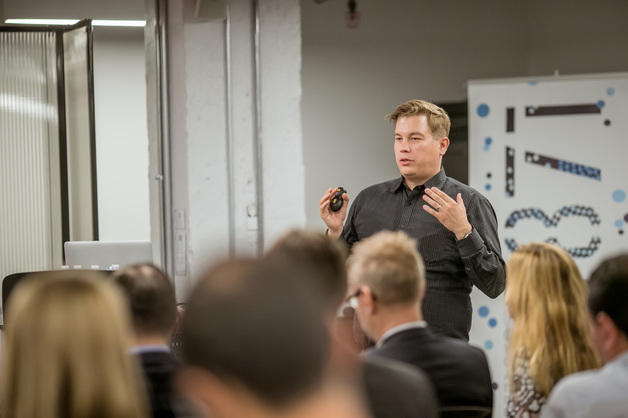|
By Charlotte Waldmeir (@cwaldmeir), Content Strategy for Sente Advisory (@Sente_Advisory Back in October, Sente along with Helsinki-based partner, LandInChicago, ran a 12-week market entry program designed exclusively to bring Finnish growth companies, like Redland, Qentinel and NOOA, to the US market. Their entry point - Chicago. Their homebase - 1871. I recently got the chance to catch up with Jonne Hirvonen - VP of Sales of the innovative digital agency, Redland, that [now] brings Scandinavian design principles to small/medium sized enterprises across the US. During our chat, Jonne discusses his decision to bring Redland to Chicago, who he networked with along the way and how he thinks Silicon Valley and Chicago compare. Charlotte [C]: How did the Finnish design startup, Redland, end up in Chicago? Jonne [J]: We have been involved in the LandinChicago acceleration program since Autumn 2016. The idea behind the program is to support Finnish companies to enter the US market, and especially, to “land in Chicago.” The decision whether or not Redland should participate was an easy one and Tekes, the Finnish organization that funds research, development and internationalization, gave us another boost by funding our project. As far as bringing our company to the US, we know from experience that design can function as a gateway to projects in technology and marketing service as customers often appreciate a one-stop shop. Due to this, our US offering is introduced on our website www.redland.agency, and supported locally by social media. [C]:Do you feel that the 8-week preperation period in your home country helped you get ready for your experience in Chicago? J: Yes. Although it was a lot of work. We had to first get focused on what we were going to sell in the US (because we offer a wide variety of services in Finland). Plus, we needed to create a solid financial plan so we could justify our market entry with our management. Finally we went through several iterations of our pitch - and got lots of practice - because we even landed in Chicago. C: What do you feel like you achieved coming to Chicago? J: While in Chicago, we met a number of different companies, entrepreneurs and partners in Chicago as well as Silicon Valley. Although we are a new company in the US, we came to Chicago with a clear story and offering and it has been well received. Also, being a part of the big 1871 startup hub and cooperating closely with Sente Advisory has helped a ton. Not to mention, there is a lot going on in Chicago and meetup culture is strong here. For example, at the end of our very first day on October 10th, we participated in an event called “Introduction to Chicago Design Community” hosted by advertising agency Leo Burnett. The idea of the event was to help young designers expand their network and help them move forward in their careers. It was interesting to realize that the same challenges and features affect design both in the US and in Finland.  C: Tell me more about your experience being based out of 1871 Chicago. What was that like? J: 1871 is the ‘center of technology and entrepreneurship in Chicago’ and hosts more than 500 companies ranging from early stage startups to large enterprises and universities. During our first week there, we attended the event TGIW (Thank God It's Wednesday) that was sponsored by Microsoft, and presented Redland along with the other LandInChicago companies, Qentinel and NOOA. As a member of 1871, we got access to its many member workshops on various topics that we participated in during the framework of our schedule. The workshops discuss topics that growth companies find interesting, such as sales, business development, negotiation skills and marketing. Another interesting service at 1871 is the ‘office hours’ and mentoring. There are more than 500 mentors actively operating in the 1871 community. Mentors are experienced professionals in their own field and they bring a lot of benefit to the community. We found these meetings useful as we got to expand our network and reach decision makers who would otherwise have been difficult to contact. - Related - .C: You mentioned going to different meetups, startup events. What were some of the biggest takeaways you had while at these events? J: Most important observation is that “design know-how” is increasingly in demand. On 12th of October, design and innovation consultancy, Fjord, organized a meet-up on the topic “Design as a Business Strategy.” At the event, Design Director, Tim Irvine, stressed the importance of design in the development of business strategy and implementation. In terms of this, Redland is on the right track, due to our investments in the development of design expertise and expansion of our own team. One sign of the importance of the matter is the fact that IBM is recruiting 5,000 designers in the future. Digitalization and large strategic projects therefore require a lot of engineering expertise.  C: What was the Demo Day like at 1871? J: On 19th of October, at 1871, we organized a Demo Day for the LandinChicago companies. The event was opened by the 1871 CEO Howard Tullman, who stressed the importance of entrepreneurs and how they play a major role in the well-being of the entire Chicago area. The event was accompanied by stakeholders, investors and companies involved in 1871. Together with Qentinel and NOOA, we held presentations and introduced our activities and services. Finnish serial entrepreneur Sampo Parkkinen, Honorary Consul of Finland, Olavi Göös, and Head of Region Americas, Tomi Rauste. from Finpro were present at a panel discussion. The contacts made in the event will be useful in the future because through our networks we will receive a lot of benefit to our operations and will receive the opportunity to discuss with a variety of different partners. C: While in the states, you also headed west to have meetings in the San Francisco/Palo Alto/Silicon Valley area. How was it? J: Because some of our meetings were held in Palo Alto, we got acquainted with morning traffic jams on highway 101 and 280. Compared to San Francisco, Palo Alto is a really clean and peaceful place. In terms of Silicon Valley, it hosts a unique community of companies funded by numerous risk investors and is home to five high quality universities, including the famous Stanford University. C: So how does Silicon Valley compare to Chicago in your opinion? J: From the perspective of living and business, the Silicon Valley area is quite expensive compared to the Chicago area that we are already experienced in. Competition for talent in Silicon Valley is fierce, which is reflected in the wages that have risen to a relatively high level. Living is quite expensive and, for example, in Palo Alto, renting a detached house of 100 sqm house costs around 5,000 bucks a month plus other expenses. Living costs in Chicago are only half of the costs in Silicon Valley and even the food is cheaper. When it comes to corporate culture, the pace in Silicon Valley is tighter than in Chicago. This is a good thing from our point of view, as things progress at a brisk pace. We were also happy to realize that people found our company and its offering interesting. I would be interested to see the same level of interest towards new partners and ways of working also in Finland, to avoid getting stuck in the present or even worse, in the past. C: What are next steps for Redland after going through the LandInChicago program? J: First and foremost, the LandInChicago program made it possible for Redland to create a plan towards internationalization. Although some of the issues were familiar to us, having an international partner gave us a clear, local viewpoint on how to do things and bring Redland to market in the US. At the moment we are going through the learnings of this second phase and will make the necessary repairs to proceed to the third stage which consists of moving to the US market in a manner suitable for Redland. You can learn more about Redland by visiting their website and by following them here:
0 Comments
|
AboutSente's blog is home to insights on trends in emerging entrepreneurial ecosystems, global start-up accelerators, Chicago's start-up ecosystem and growth funding. Archives
December 2016
Categories |


 RSS Feed
RSS Feed
